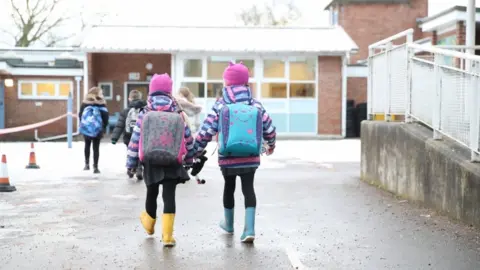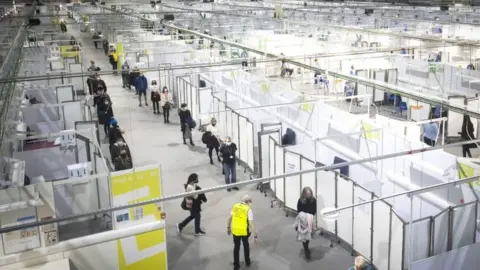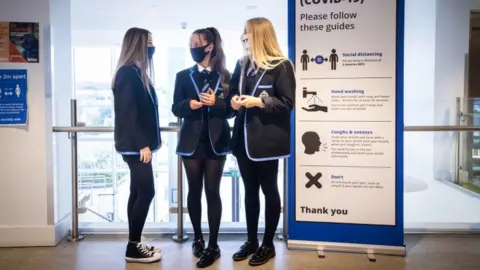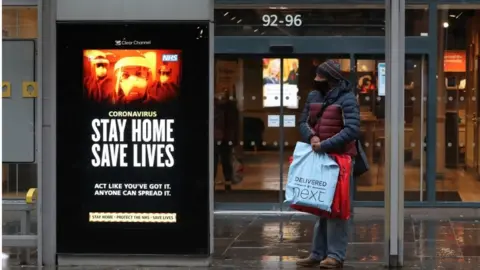Covid: Scottish schools to start phased return this month
 PA Media
PA MediaScotland's youngest pupils are likely to return to the classroom full time from 22 February as schools start a phased reopening.
The move will include all pupils in P1-P3 as well as pre-school children.
There will also be a part-time return, but on a very limited basis, for senior secondary pupils to allow them to complete work for national qualifications.
A final decision will be taken on the partial reopening in a fortnight.
Further details of the next phase of the gradual return to schools will also be set out at that point, alongside a timescale for the return of in-person learning for colleges and universities.
Scotland's largest teaching union, the EIS, questioned why the first minister had not mentioned any need for P1-P3 pupils to socially distance, and said it wanted to see the scientific evidence to justify the approach.
The union added: "Clearly, any school return remains contingent upon continued progress on community suppression of the virus and that is not a given so we need to see infection levels coming down substantially before the return date can be confirmed."
All of the country's other lockdown restrictions will remain in place until at least the end of the month, First Minister Nicola Sturgeon said.
But she said she was "cautiously optimistic" that some gradual easing of the rules could be possible from early March.
The first minister also announced that travellers coming to Scotland from any country may be asked to quarantine in a hotel - which goes further than systems announced in the rest of the UK.
Business groups have called on the Scottish government to provide firms with a route map out of lockdown.
 PA Media
PA MediaMs Sturgeon said the government intended to allow "small increases" in existing provision for children and young people with significant additional support needs from 22 February.
And she said there would be a "significant expansion" of testing in schools and nurseries in the coming weeks, with tests available for both staff and senior secondary pupils.
The first minister said older pupils will only be able to return after 22 February to ensure practical work important to achieving qualifications is completed.
Only between 5% and 8% of a secondary school's pupil roll will be able to be present at any one time.
Ms Sturgeon also stressed that the schools announcement was dependent on the virus continuing to be suppressed.
 PA Media
PA MediaSchools across Scotland have been closed to the vast majority of pupils since the Christmas holidays, with learning being done at home and online.
Health experts have warned that the country risks facing a "lost generation" unless a way can be found to get young people back to some sort of normality.
Interim Scottish Labour leader Jackie Baillie said that most children will have missed more than half a year of normal, in-person schooling as she called for greater investment to be put in place "for some time to come" to help them catch up.
And the Scottish Conservatives accused the government of failing to get the proper digital support in place for home learning, which it said would further widen the attainment gap between wealthier and less well off pupils.


The current stay-at-home lockdown, like the last one, is a long slog. It will last what's left of the winter. But as we move into spring, change is coming.
Plans to re-open nurseries and schools from 22 February for the youngest children will not only restore their full time education but will allow some parents to resume work.
However, the phased return of schools could add to the burden some families have to carry.
If, for instance, you have a young child to get to school and an older pupil to organise for online learning at home, that could be harder to manage than either having both at home or both in school.
It is not clear how quickly full time schooling will resume for all age groups.
It will be another fortnight before the first minister sets out how wider restrictions might be eased from the beginning of March.
It is already clear that process will be gradual and that some measures like social distancing, wearing face coverings and avoiding international travel will not be lifted anytime soon.

Ms Sturgeon told the Scottish Parliament that she wanted to see children back in full-time, face to face education as quickly as possible.
And she said she was acutely aware of the wider health, developmental and social harms being experienced by young people while they were not in school, and of the pressure school closures was putting on working parents and family life.
But she said the current state of the pandemic and the need to protect the country as much as possible from the virus meant that her options for reopening schools were limited.
She added: "The judgment the Cabinet arrived at this morning, based on the advice of our expert advisers, is that if we all agree to abide with the lockdown restrictions for a bit longer - so that our progress in suppressing the virus continues - we can begin a phased, albeit gradual, return to school from 22 February."
All of mainland Scotland and some islands are currently under the country's toughest level four restrictions, with non-essential shops closed and strict travel rules in force.
And there has been growing concern in recent days that Scotland's vaccination programme is lagging behind the rest of the UK.
The country had vaccinated the lowest percentage of its adult population - 13.4% - of all of the four UK nations by Tuesday.
The figure for England stood at 18.4% while it was 17% in Wales and 15.6% in Northern Ireland.
The UK government's Scottish secretary, Alister Jack, has written to Ms Sturgeon offering the help of the English health department and the Ministry of Defence to accelerate the rollout in Scotland.
Mr Jack said: "I strongly believe that to put the nightmare of Covid-19 behind us as quickly as possible, we must collaborate as closely as possible."
A further 34,881 people were given their first does of the vaccine in Scotland since Monday, the highest daily total so far.
The country will need to average about 40,000 a day if it is to hit its target of vaccinating everyone over the age of 70 and the extremely clinically vulnerable by the end of next week.
It brings the total number of people to have received the vaccine in Scotland, which has about a twelfth of the UK population, to 610,778.
The UK as a whole had vaccinated just over 9.6 million people by Tuesday.
 PA Media
PA MediaCovid-19 prevalence in Scotland has fallen under the lockdown regulations from 302 per 100,000 in the week ending 8 January to 136 per 100,000 last week.
Test positivity has also reduced to an average of 6.6% in the seven days up to 29 January - still higher than the 5% that the World Health Organisation considers to be indicative of an outbreak being under control.
Ms Sturgeon said: "Pressure on our NHS continues to be severe. The number of Covid patients being treated in hospital remains around 30% above the high point of the first wave last April.
"However, hospital admissions in this wave appear to have peaked on January 12. They have now stabilised and are starting to reduce, albeit slowly."


Do you have a question about the Covid restrictions in place in Scotland? Use the form below to send us your questions and we could be in touch.
In some cases your question will be published, displaying your name, age and location as you provide it, unless you state otherwise. Your contact details will never be published. Please ensure you have read the terms and conditions.
If you are reading this page on the BBC News app, you will need to visit the mobile version of the BBC website to submit your question on this topic.


